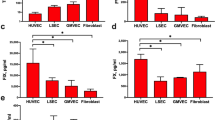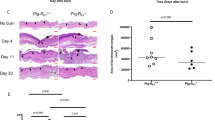Abstract
AN inhibitor of fibrinolysis has recently been found in bovine mesothelium1. Recent experiments in our laboratory, using Todd's technique of fibrinolysis autography2 on normal and traumatized human skin (unpublished results), suggested the possibility that human epidermis contains an inhibitor of fibrinolysis. Experiments were therefore designed to determine if inhibition by the epidermis could be demonstrated.
This is a preview of subscription content, access via your institution
Access options
Subscribe to this journal
Receive 51 print issues and online access
$199.00 per year
only $3.90 per issue
Buy this article
- Purchase on Springer Link
- Instant access to full article PDF
Prices may be subject to local taxes which are calculated during checkout
Similar content being viewed by others
References
Pugatch, E. M. J., and Poole, J. C. F., Nature, 221, 269 (1969).
Todd, A. S., Nature, 181, 495 (1958).
Kiistala, U., J. Invest. Derm., 50, 129 (1968).
Author information
Authors and Affiliations
Rights and permissions
About this article
Cite this article
TURNER, R., KURBAN, A. & RYAN, T. Inhibition of Fibrinolysis by Human Epidermis. Nature 223, 841–842 (1969). https://doi.org/10.1038/223841a0
Received:
Issue Date:
DOI: https://doi.org/10.1038/223841a0
This article is cited by
-
Human skin proteases
Archives of Dermatological Research (1976)
-
Human skin proteases
Archiv f�r Dermatologische Forschung (1972)
-
Human skin proteases
Archiv f�r Dermatologische Forschung (1972)
-
Fibrinolytic Activity in Human Skin Following Epidermal Injury**From the Institute of Dermatology, St. John's Hospital for Diseases of the Skin, London, W.C.2.
Journal of Investigative Dermatology (1969)
Comments
By submitting a comment you agree to abide by our Terms and Community Guidelines. If you find something abusive or that does not comply with our terms or guidelines please flag it as inappropriate.



